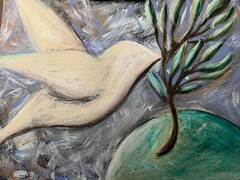Noach
10/19/2023 04:18:17 PM
| Author | |
| Date Added | |
| Automatically create summary | |
| Summary |
Wednesday morning, I tried to put a Band-Aid on a war. Like many of us, I was looking for something to do, something to help myself process the steady stream of horrifying headlines flowing in from Israel and Gaza, with their ripple effects around the world, inciting hate crimes in other places like Belgium and even Chicago. Like many of us, I had no idea where to start. In the absence of any real ideas, I picked up a paintbrush and made an abstract rendering of a nondescript earth with an olive branch floating above it. From the left, a sightless dove gingerly holds the olive branch in its beak.

Whether or not you have recently read this week’s Torah portion, Noach, the image of a dove and an olive branch probably resonates with you on some level, thanks to the well-known biblical story of the flood. A quick refresher on the details: full of anger at the evil “inclination of man’s heart,” God calls on Noah to build an ark to preserve his own family members and each kind of animal, and once Noah has carried out his instructions, God floods creation, killing countless humans and creatures to purge the earth of evil. (Following the trend of current events reporting, I feel compelled to add that the masses erased from existence doubtlessly included a certain number of women, children, and elderly people.)
The olive branch comes into play when Noah, 54 days after the start of the flood, sends out a dove to see if the waters have receded. This dove, the third bird to have been released since the end of the 40-day rainfall, returns with an olive branch in its beak, and Noah ostensibly breathes a massive sigh of relief. The chaos and destruction brought about by God’s wrath have subsided. As devastating as the flood must have been, the survivors will soon be able to repopulate the earth, secure in the knowledge that God has renewed his Covenant with them and with “every living being […] for all time and all generations.” As a reminder of this eternal Covenant, God sends another easily recognizable symbol: a rainbow. God explains to the survivors, “when I see my rainbow in the clouds, I will recall the Covenant that exists between me, you, and every living soul on earth.”
This week, an Israeli photographer named Amir Cohen, based out of Ashkelon, Israel, also tried to put a Band-Aid on the war. In a photograph released by Reuters on October 15th, he captured an image of a vibrant rainbow, serenely brightening the sky along a border between the Gaza Strip and somewhere in southern Israel. Some might see in this image a cynical irony, a reminder that “every living soul on earth” is not protected from being wiped from the face of the earth. Others might see a cry from the heart, a fervent desire for the rainbow to work its magic and restore peace and love to people who have known terror, fear, and devastation.

With so many lives needlessly destroyed and so many hostages being held, few people are calling for the extension of an olive branch at this moment in time. Very few of us put any stock in the promises made by rainbows. And yet the Torah brings this imagery to us, year after year, even though “the inclination of man’s heart is evil from his youth.” God acknowledges after the flood that human nature has not fundamentally changed, but the promise is given, all the same, that God will keep the Covenant. May we also remember our promise to engage in tikkun olam, to work tirelessly to repair and improve the world, even when so many within it have evil in their hearts. We may be sitting helplessly at home with nothing but Band-Aids, but let us hand them out liberally, wherever we can.
Perhaps the best Band-Aid that I can offer to you this Shabbat is a quote from the inimitable writer Maya Angelou, a woman who called for love in the face of violence and suffering. Three years before her passing, she shared the following words with her good friend Oprah on Super Soul Sunday: "The thing to do, it seems to me, is to prepare yourself so you can be a rainbow in somebody else's cloud. Somebody who may not look like you. May not call God the same name you call God -- if they call God at all. I may not dance your dances or speak your language. But be a blessing to somebody. That's what I think."
Shabbat Shalom
Rebecca Abbate
Mon, October 27 2025
5 Cheshvan 5786
Update this content.
3 Main Street
Cheshire, CT
06410
Privacy Settings | Privacy Policy | Member Terms
©2025 All rights reserved. Find out more about ShulCloud



